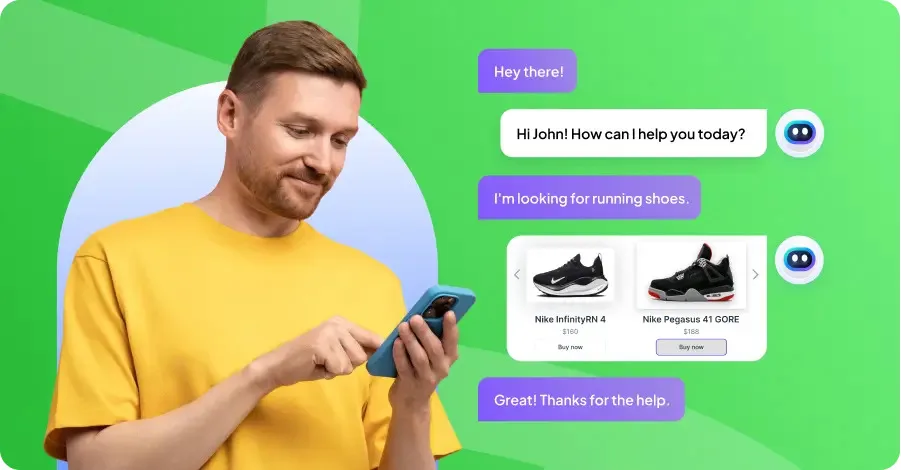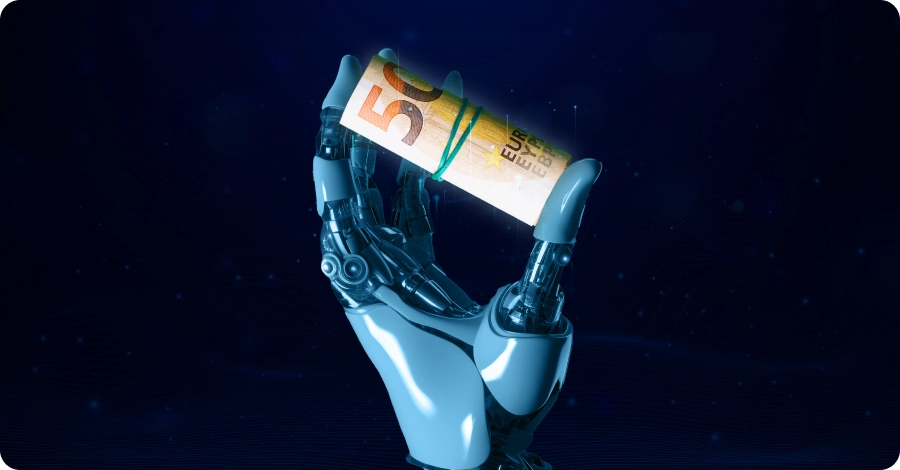B2B Chatbots: Features, Use Cases & Examples
- May 13, 2024
- 12 mins read
- Listen

Table of Content
Chatbots are not just for B2C. More B2B companies are turning to them to address their various challenges. From automating tasks to providing instant support, a B2B chatbot can add value to different aspects of the business.
Today, 58% of B2B companies have implemented a chatbot to drive their processes. This number will grow further as AI-powered technology has tremendous potential and can help drive marketing and sales efforts.
These bots have the power and features to transform the way B2B entities go about their business. That’s why they are now integral to the industry.
In this blog, we will explore B2B chatbots in detail, understand their benefits, and see some top use cases and real-life examples from different industries.
But, before moving further, let’s first start with the definition…
What is a B2B Chatbot?
A B2B chatbot is a software application primarily used for customer communication and customer service delivery tasks. It’s powered by artificial intelligence technology and can facilitate interaction between businesses and their customers.
B2B chatbots can be integrated into various digital platforms such as websites, business apps, or messaging apps and enable engagement with users in real-time. They are used for facilitating conversations with users through speech or texts.
REVE Chat’s B2B chatbot is a good example of how companies can leverage the power of AI to serve their customers better. These bots can understand complex inquiries and provide relevant information.
They can even automate various business processes. By using an advanced business-to-business chatbot, companies can improve customer service and enhance user experiences, resulting in efficiently meeting customer needs.
Why Is B2B Chatbot Important for Your Business?
Chatbots are now integral to successful B2B operations. More companies rely on them to boost efficiency and productivity across sales, support, and marketing. From customer engagement to lead generation, they can enable tasks that may otherwise require intensive manual efforts. That’s why 80% of businesses currently use or are planning to use chatbots to improve various processes and operations.
Here are the key reasons for using chatbots in B2B –
Enhancing customer service
Chatbots are advanced with the capability to handle customer inquiries of any nature and provide 24/7 support. That’s why B2B companies use them to offer timely assistance to customers which results in improved overall satisfaction.
Automating routine tasks
There are many routine tasks that a chatbot can easily automate such as handling customer queries, order processing, appointment scheduling, etc. Their automation capabilities free up employees and save their valuable time, resulting in improved productivity.
Supporting lead generation efforts
B2B companies can leverage chatbots to engage website visitors, qualify leads, and gather key information. This is why bots prove a key tool to support lead generation efforts.
Collecting customer data and insights
Chatbots can help businesses collect valuable data and insights about customer behavior and preferences. They are a very helpful tool to get actionable intelligence for driving decisions and strategies.
Delivering personalized experiences to customers
Chatbots today are equipped with machine learning algorithms that help them analyze customer data and tailor communications based on individual preferences. This can help you deliver personalized experiences to customers.
Maintaining operational efficiency
B2B enterprises can use chatbots to reduce or minimize the need for human effort in repetitive tasks. This can lead to cost savings and operational efficiency, resulting in profitability. After all, businesses can save an average of $0.70 per interaction by using chatbots for customer service inquiries. ( Juniper Research )
Achieving scalability
Chatbots are capable of handling multiple conversations and customers simultaneously. This enables businesses to successfully manage fluctuations in demand and achieve scalability as they grow.
Key Features to Look Out for in B2B Chatbots
Not all B2B chatbots are created equal. That’s why you need to evaluate them properly. If you don’t, you might miss out on important features that can add real value to your business. Make sure you look for features aligning with your specific needs for improving services and processes.
Here are the key features to look out for in B2B chatbots –
Multi-channel support
Customers can use one of many channels to connect with your business. You’re never sure which channel they might prefer to connect with you. It’s therefore important to select a chatbot that can work effectively across multiple channels. Be it your website, messaging apps, or social media channels, your bot should enable multi-channel support to ensure a unified and consistent experience.
Multilingual support
B2B companies often look to expand their presence and reach out to more customers. They want to engage and connect with customers from across the world. This, however, can’t be achieved unless there is a chatbot offering conversations in multiple languages. You can find chatbots enabling multilingual support and helping you manage geographical boundaries with ease.
Advanced analytics and reporting
A business needs to gain detailed insights into user interactions and engagement patterns. This helps them better understand customer needs and areas for improvement. B2B chatbots with advanced analytics and reporting features enable various performance metrics that can be leveraged to gain data-driven insights and improve customer experience.
Personalization capabilities
Customers have evolved and they want brands to provide them with personalized experiences. You can choose an AI chatbot for B2B offering advanced personalization features. This will help you tailor engagement based on user data and behavior. Such chatbots can help you deliver personalized responses and recommendations, resulting in enhanced service delivery and experience.
Sentiment analysis
Chatbots are extremely intelligent now as they can determine the emotion behind a customer’s message. They can extract opinions, thoughts, or sentiments from text or audio data which B2B businesses can use to understand customer satisfaction levels. It’s therefore important to select a chatbot that has sentiment analysis features.
AI and natural language processing (NLP)
Chatbots should understand user queries and respond naturally and conversationally. This feature is only possible when the bot is built using advanced AI and natural language processing (NLP) technologies. Bots that use AI and NLP can handle complex queries with ease and deliver relevant responses.
Top Use Cases of B2B Chatbots
B2B chatbots can add great value to various aspects of business operations. Be it customer support, sales, or marketing, you can deploy an advanced AI-powered chatbot and complement your various business activities in a big way.
Let’s look at the top use cases of B2B bots –
Customer support and service
B2B companies can use chatbots to provide quick responses to support requests and handle routine queries. Bots can also help troubleshoot common issues and be available round the clock for customers requiring support. From handling FAQs to guiding users through solutions, the bot can elevate customer service in many ways. On top of that, a business can automate customer support and expect the bot to escalate complex conversations to human agents. Response time will improve and errors reduced when bots perform customer service tasks. ensuring consistent and reliable support as and when needed.
Lead qualification
B2B business can use an AI bot and drive engagement. You can use it as the first point of contact and engage website visitors. Using the chatbot, a business can qualify leads and better understand customer needs and pain points. You can always collect key information from customers and understand their preferences. You can then use the data to route leads to sales teams. The key is to deploy chatbots to start conversations with website visitors and ask qualifying questions. A business can also offer dynamic and tailored responses based on the buying intent of customers.
Engagement and lead nurturing
Bots not only help with lead qualification but can also help engage your prospects over time. That’s why 36% of companies turn to chatbots to improve their lead-generation effort. It’s, however, important to analyze the stage in the buying journey and then make the offers align with customers’ interests. You can implement an automated follow-up to nurture leads gradually. In addition, you can utilize the prospects’ previous interactions and personalize offers. You can also adjust your nurturing strategy based on the prospect’s engagement with the bot.
Product demos and trials
AI chatbots can help you do away with manually scheduling product demos and trials. You can automate this important task and add efficiency to the entire sales process. Your prospects can now schedule demos or appointments directly through the chatbot. All you need to do is integrate the bot with your calendar system. When you automate demos and trials, both your prospects and sales representatives can experience a seamless experience. This will also help streamline the process, resulting in improved efficiency with your sales operations.
Data collection and analysis
Businesses that collect and analyze data on customers better understand their needs and serve them better. This also helps them refine marketing strategies and make informed decisions. AI-powered chatbots can be used to collect and analyze data from user interactions. A B2B enterprise can use the bot to gather key insights such as feedback, preferences, and behavioral patterns. B2B bots can provide actionable insights that be used to gain a competitive edge in the market.
Post-sale assistance
A chatbot can prove very helpful when it comes to offering post-sales support and following up with customers. This way you can use the bot to identify chances for upselling and referrals as well. With post-sales support, you can also gather feedback and foster customer loyalty. You can use chatbot interactions to identify upselling opportunities and understand customers’ needs and usage patterns for additional offers.
B2B Chatbot Examples
A growing number of B2B companies use chatbots to support various aspects of their business operations. The bot enhances their capabilities and helps them serve customers better. On top of that, bots can help economize operations and save costs.
Let’s look at B2B chatbot examples –
1. Legrand transforming its customer support operations
Legrand is a global specialist in digital building infrastructure. It has been leveraging global knowledge to customize offerings and deliver solutions across categories. The company’s support team was facing constant challenges in managing the influx of customer queries.
So, it partnered with REVE Chat and soon an advanced AI-powered chatbot started handling 80% of queries. This minimized the workload of the support team which could now focus more on addressing critical issues promptly.
The chatbot also helped boost response times and reduce wait times for customers. This contributed significantly to enhancing overall customer satisfaction for the business.
2. Pardgroup achieving higher customer satisfaction rates
Pardgroup is a multinational field marketing and retail services agency, offering a complete all-round service to the retail world. It delivers high-end projects on behalf of top luxury global brands.
The company’s support team was overburdened with a big influx of customer queries. This was impacting the service delivery and performance. So, it decided to partner with REVE Chat and it then deployed an AI chatbot.
With the REVE bot, the company was able to handle more than 80% of its customer queries. This freed up agents who then could handle more complex tasks. Soon, the company witnessed an increase in the satisfaction rate and the number of happier customers.
3. Commercial Bank of Kuwait (CBK) enables quick access to services
The Commercial Bank of Kuwait is one of the largest financial institutions in Kuwait, and also the second oldest bank in Kuwait. It has a strong and growing corporate and retail banking franchise offering innovative financial and investment solutions to its constantly expanding customer base.
The company was exploring an option to redefine customer support and then it partnered with REVE Chat for an advanced AI chatbot. The REVE bot helps CBK provide 24×7 customer support, and handle inquiries, and transactions from anywhere and at any time.
The bot has helped CBK automate routine inquiries and services, reducing customer wait times. The bot also enabled CBK to assist customers in multiple languages. The company has also integrated the chatbot with its online and mobile banking platforms, resulting in an excellent user experience and quick access to services.
B2B Chatbots – Key Takeaways
Chatbots are important for B2C companies as much as they are for B2B. They help automate tasks across sales, marketing, and support, resulting in the delivery of enhanced customer experience. Bots are now integral to the B2B industry as they can contribute significantly.
In this blog, we also understood the definition of a B2B chatbot and learned its importance for the industry. We discussed the reasons why a bot is important for the business and how it can add value in many aspects.
We saw how a B2B chatbot can help a business in various ways, including –
- Enhancing customer service
- Automating routine tasks
- Supporting lead generation efforts
- Collecting customer data and insights
- Delivering personalized experiences to customers
- Maintaining operational efficiency
- Achieving scalability
Moving further, we explored key features to look out for in B2B chatbots, including multi-channel support, multilingual support, advanced analytics and reporting, personalization capabilities, sentiment analysis, and AI and natural language processing (NLP).
After analyzing the key features of a chatbot, we evaluated the top use cases where we harped on the many ways a business can use these bots. We found how use cases of a business-to-business chatbot can be varied, including –
- Customer support and service
- Lead qualification
- Engagement and lead nurturing
- Product demos and trials
- Data collection and analysis
- Post-sale assistance
In the end, we discussed some real-life examples of brands from across industry verticals using B2B chatbots to accomplish a variety of tasks. We touched upon the examples of Legrand, Pardgroup, and Bank of Kuwait.
At REVE, we understand how engagement drives business growth. So, the more you engage with your customers, the better you understand them, resulting in business growth. Having said that, we realize the huge value that a chatbot can add to your B2B business. That’s why we offer a range of engagement tools for you.
With us, you can sign up and explore tools for customer engagement on any scale.
Frequently Asked Questions
A B2B chatbot can add value to a business in many ways, including –
1.Help offer timely assistance to customers which results in improved overall satisfaction
2.Automate routine tasks and free up agents to focus on more productive tasks
3.Engage website visitors, qualify leads, and gather key information
4.Collect valuable data and insights about customer behavior and preferences
Yes, it’s possible! B2B enterprises can use AI-powered chatbots to reduce or minimize the need for human effort in repetitive tasks. This can lead to cost savings and operational efficiency, resulting in profitability.
A B2B chatbot can be integrated with any channel, be it websites, messaging apps, or social media platforms. It can also work effectively across multiple channels. So, customers using any channel can use the bot to connect with the business.
A B2B bot can add value in many ways as it enables various use cases, including
1.Customer support and service
2.Lead qualification
3.Engagement and lead nurturing
4.Product demos and trials
5.Data collection and analysis
6.Post-sale assistance
Legrand using REVE Chat’s AI chatbot is a good example of a brand using a B2B chatbot. Using the chatbot, its support team was able to handle 80% of queries. This minimized their workload and freed them to focus more on addressing critical issues promptly.



